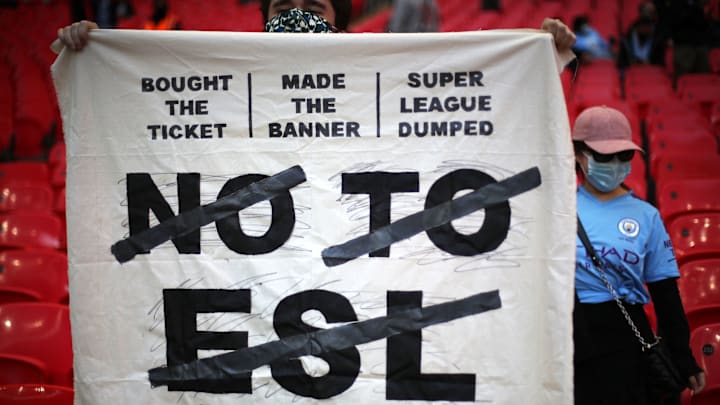The European Super League (ESL) has been one of the most controversial topics in the world of football in recent years.
Initially announced in April 2021, the ESL faced significant backlash from fans, governing bodies, and some clubs, leading to its quick suspension.
However, the concept has not been entirely abandoned, and recent decisions by the European Court of Justice (ECJ) and the Spanish Court have further influenced the future of this proposed league. This article delves into these court decisions and their implications for the future of the European Super League.
Background of the European Super League
The European Super League was proposed as a breakaway competition involving some of the most prestigious football clubs in Europe. The founding members included prominent clubs from England, Spain, and Italy. The idea was to create a midweek competition that would rival the UEFA Champions League, providing more frequent high-profile matches and greater financial rewards for the participating clubs.
The announcement met with immediate and widespread opposition. UEFA, FIFA, national leagues, and football associations condemned the plan, and fans protested vigorously. Within days, several founding clubs, particularly from the English Premier League, withdrew from the ESL, leading to its suspension.
Recent Developments
Despite the initial failure, the concept of the ESL has not been entirely discarded. The remaining proponents have continued to push for its realization, arguing that it could bring substantial financial benefits and address some of the systemic issues in European football.
In 2022, the ESL received a boost when the Spanish Commercial Court issued a preliminary ruling in favor of the league, stating that FIFA and UEFA could not prevent the creation of the ESL or impose sanctions on the clubs and players involved. This decision was seen as a significant victory for the ESL proponents, giving them legal grounds to continue their efforts.
European Court of Justice Ruling
The case was subsequently referred to the European Court of Justice (ECJ) for a more comprehensive ruling. In December 2022, the ECJ delivered a significant verdict. The court acknowledged that while FIFA and UEFA have the right to sanction clubs involved in breakaway competitions, they must also respect EU competition law.
The ECJ's ruling was nuanced, balancing the interests of the existing football governing bodies with the principles of competition law. The court stated that while UEFA and FIFA could impose sanctions, any such measures must be proportionate and justified by legitimate objectives, such as preserving the open nature of football competitions and ensuring fair competition.
This decision was interpreted as a partial victory for both sides. It affirmed the regulatory authority of UEFA and FIFA while also recognizing the rights of clubs to explore alternative competition formats within the bounds of EU law.
Spanish Court Decision
In parallel with the ECJ ruling, the Spanish Court delivered its final judgment in early 2023. The Spanish Court reiterated its earlier stance, emphasizing that FIFA and UEFA could not take punitive actions against clubs solely for participating in the ESL. The court argued that such actions would constitute an abuse of dominant position and violate EU competition law.
The Spanish Court's decision reinforced the legal protections for clubs wishing to join the ESL, further complicating the regulatory landscape for UEFA and FIFA. This ruling provided additional legal clarity and support for the ESL proponents, suggesting that they could proceed without fear of immediate sanctions from the traditional governing bodies.
Implications for the Future of the European Super League
The combined effect of these rulings has significant implications for the future of the European Super League:
1. Legal Precedent: The decisions by the ECJ and the Spanish Court establish important legal precedents that could embolden the ESL proponents. Clubs may feel more confident in exploring the ESL concept, knowing that they have some legal protection against sanctions.
2. Regulatory Adjustments: UEFA and FIFA may need to adjust their regulatory frameworks to comply with EU competition law. This could involve creating more flexible and inclusive competition structures that address the concerns of top clubs while preserving the integrity of the sport.
3. Negotiation and Compromise: The rulings may force a dialogue between the ESL proponents and the traditional governing bodies. A negotiated solution that addresses the financial and competitive concerns of elite clubs while maintaining the traditional football pyramid could emerge as a viable outcome.
4. Fan and Stakeholder Reaction: Despite the legal victories, the success of the ESL will also depend on the reaction of fans, players, and other stakeholders. The initial backlash demonstrated the power of fan sentiment, and any future attempts to launch the ESL will need to address these concerns comprehensively.
5. Financial Dynamics: The financial model of European football may continue to evolve, with clubs seeking new revenue streams and more control over their commercial interests. The ESL could play a role in this transformation, potentially leading to a more fragmented but financially lucrative football landscape.
Conclusion
The future of the European Super League remains uncertain, but recent court decisions have provided new momentum for its proponents. The ECJ and Spanish Court rulings have clarified some of the legal ambiguities and offered protections for clubs interested in the ESL. However, significant challenges remain, including regulatory adjustments, fan sentiment, and the need for a balanced approach that addresses the interests of all stakeholders in European football. The coming years will likely see further developments as the battle for the future of European club competitions continues.
